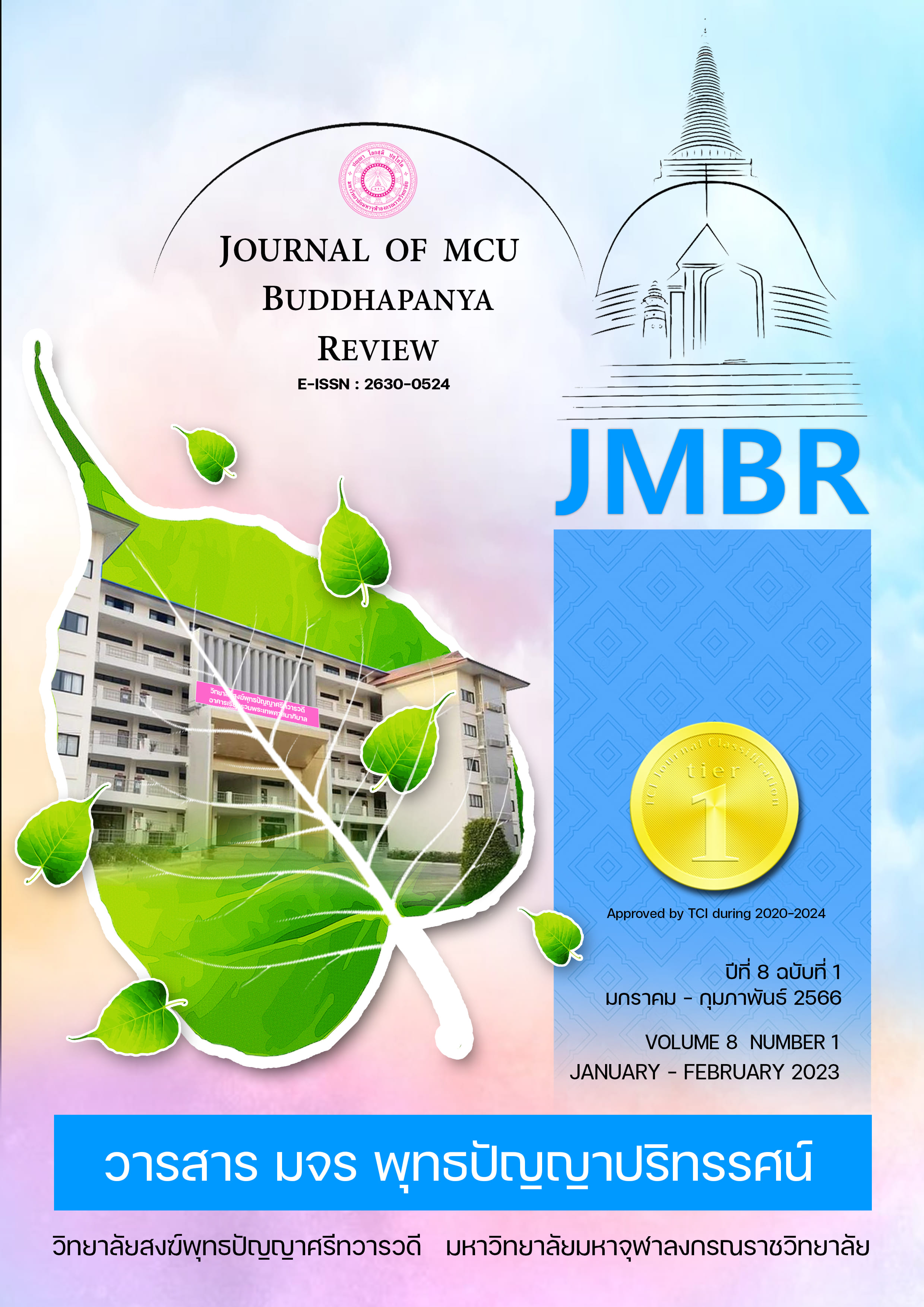บุคลิกภาพแบบแสดงตัวและการรับรู้ข้อมูลป้อนกลับในการทำงานที่พยากรณ์การพัฒนาตนเองของพนักงานกลุ่มบริษัทโลจิสติกส์
คำสำคัญ:
บุคลิกภาพแบบแสดงตัว, , การรับรู้ข้อมูลป้อนกลับในการทำงาน, , การพัฒนาตนเองบทคัดย่อ
การวิจัยครั้งนี้เป็นการวิจัยเชิงปริมาณมีวัตถุประสงค์ 1) เพื่อศึกษาระดับการพัฒนาตนเอง บุคลิกภาพแบบแสดงตัว และการรับรู้ข้อมูลป้อนกลับในการทำงานของพนักงานกลุ่มบริษัทโลจิสติกส์ 2) เพื่อศึกษาความสัมพันธ์ระหว่างบุคลิกภาพแบบแสดงตัว และการพัฒนาตนเองของพนักงานกลุ่มบริษัทโลจิสติกส์ 3) เพื่อศึกษาความสัมพันธ์ระหว่างการรับรู้ข้อมูลป้อนกลับในการทำงาน และการพัฒนาตนเองของพนักงานกลุ่มบริษัทโลจิสติกส์ 4) เพื่อพยากรณ์การพัฒนาตนเอง ด้วยบุคลิกภาพแบบแสดงตัว และการรับรู้ข้อมูลป้อนกลับในการทำงานของพนักงานกลุ่มบริษัทโลจิสติกส์ กลุ่มตัวอย่างที่ใช้ในการศึกษาเป็นพนักงานกลุ่มบริษัทโลจิสติกส์ จำนวน 332 คน โดยสุ่มกลุ่มตัวอย่างแบบแบ่งชั้นตามสัดส่วน เครื่องมือที่ใช้ในการเก็บรวบรวมข้อมูลเป็นแบบสอบถาม ทำการวิเคราะห์ข้อมูลโดยค่าความถี่ ค่าร้อยละ ค่าเฉลี่ย ค่าส่วนเบี่ยงเบนมาตรฐาน ค่าสัมประสิทธิ์สหสัมพันธ์เพียร์สัน และการวิเคราะห์ถดถอยพหุคูณแบบขั้นตอน
ผลการวิจัยพบว่า 1) บุคลิกภาพแบบแสดงตัว การรับรู้ข้อมูลป้อนกลับในการทำงาน และการพัฒนาตนเองของพนักงานกลุ่มบริษัทโลจิสติกมีค่าเฉลี่ยอยู่ในระดับมากที่สุด 2) บุคลิกภาพแบบแสดงตัวมีความสัมพันธ์ทางบวกกับการพัฒนาตนเองของพนักงานกลุ่มบริษัทโลจิสติกส์อย่างมีนัยสำคัญทางสถิติที่ระดับ .01 3) การรับรู้ข้อมูลป้อนกลับในการทำงานมีความสัมพันธ์ทางบวกกับการพัฒนาตนเองของพนักงานกลุ่มบริษัทโลจิสติกส์อย่างมีนัยสำคัญทางสถิติที่ระดับ .01 4) บุคลิกภาพแบบแสดงตัวและการรับรู้ข้อมูลป้อนกลับในการทำงานด้านข้อมูลป้อนกลับสามารถร่วมกันพยากรณ์การพัฒนาตนเองของพนักงานกลุ่มบริษัทโลจิสติกได้ร้อยละ 73.90 อย่างมีนัยสำคัญทางสถิติที่ระดับ .01
เอกสารอ้างอิง
Buppan, K., Semheng, S. and Solkosoom, S. (2008). A Study of Some Factors Affecting Self-Development According to Ethical Code of Professional Teacher Career on Professional, Vision, and Personality of Secondary Teachers Under the Office of Educational Area 1. Academic Journal of Education, 9(2), 181-188.
Bureerum, T. (2018). The Effects of Expertise in Finance and Accounting on Job Quality of Staff of Finance and Accounting in Mahasarakham University. Journal of Humanities and Social Sciences Mahasarakham University, 40(1), 79-89.
Cardy, R. L. & Leonard, B. (2011). Performance Management: Concepts, Skills and Exercises. (2nd ed.). Amonk, New York: M.E. Sharpe.
Chanwichit, C. & Chantuk, T. (2018). Feedbacks Giving That Affect the Performance of Employees in the Production Line. Veridian E-Journal,Silpakorn University (Humanities, Social Sciences and arts, 11(1), 290-302.
Daft, R. L. (2008). The Leadership Experience. (4thed.). Ohio: Thomson South-Western.
Development of Business Development. (2019). Thai logistics business it's time to adjust – change the way of thinking Use technology to help manage turn competitors into partners. Retrieved October 16, 2021, from https://www.dbd.go.th/news_view.php? nid=469414627
Kalyanamitra, K (2021). Skill essential for the future work performance in the post covid-19 era. Journal of MCU Buddhapanya Review, 6(3), 163-176.
Kemp, J. E. & Williams, G. L. (1982). Improving Your Professional Effectiveness: Handbook For Managers in Education. Sheffield Hallam University.
Ilgen, D. R., Fisher, Cynthia D. and Taylor, S. M. 1979. Consequences of Individual Feedback on Behavior in Organizations. Journal of Applied Psychology, 64(4), 349-371.
Kaeokangwan, S. (2018). Personality Psychology Theory. (17th ed.). Bangkok: Moh-Chao-Ban Publishing House
Meesuttha, A. & Sachukorn, S. (2011). Performance Appraisal. (18th ed.). Bangkok: Technology Promotion Association (Thailand-Japan)
Pansuwan, S., Thumthong, K. & Phramaha Weeratis Varinto. (2001). A Ccultivation of habit for
self-development to successfulness according to buddhis scriptural principles. Journal
of MCU Buddhapanya Review, 6(3), 205-214.
Piampratom, A. (2010). Feedback Giving and Receiving Impacting on Employees Performance: A Case Study of Siam Cement (Kaeng Khoi) Co., Ltd. Chulalongkorn Business Review, 32(126), 127-159.
Piamsomboon, P. (1999). Performance Appraisal. Bangkok: School of Public Administration, National Institute of Development Administration.
Ponbunparod, P. & Samrong, A. (2017). The Relationships Between Proactive Personality, Transformational Leadership And Organizational Climate Affecting Learning Organization Behaviors of Officers in the National Health Security Office. Ph.D. in Social Sciences Journal, 7(3), 98-108.
Poonputta, A. (2017). A Model of Informative Feedback on Improving Classroom Research Competencies of Internship Students in Teaching Profession, Rajabhat Maha Sarakham University. Social Sciences Research and Academic Journal, 13(37), 61-74.
Suphaphon, N. (1991). Personality Theory. Bangkok: Department of Psychology, Faculty of Humanities, Srinakhonrinwirot University.
Taraphot, T. & Demrisuk, S. (2001). Human Behavior and Self Development. Bangkok: Thipphawitsut.
Thienphut, D. (2000). Human Resource Management in the Next Decade. Bangkok: Chulalongkorn Publishing
Udomthammanupap, M. (2008). Psychology for self development. Bangkok: Suan Dusit Rajabhat University Publishing.
Wichawut, S. (2010). Introduction to Industrial and Organizational Psychology. (3rd ed.). Bangkok: Thammasat Publishing
Yamane, T. (1967). Statistics, An Introductory Analysis. (2nd ed.). New York: Harper and Row.
ดาวน์โหลด
เผยแพร่แล้ว
รูปแบบการอ้างอิง
ฉบับ
ประเภทบทความ
สัญญาอนุญาต
ลิขสิทธิ์ (c) 2023 วารสาร มจร พุทธปัญญาปริทรรศน์

อนุญาตภายใต้เงื่อนไข Creative Commons Attribution-NonCommercial-NoDerivatives 4.0 International License.



